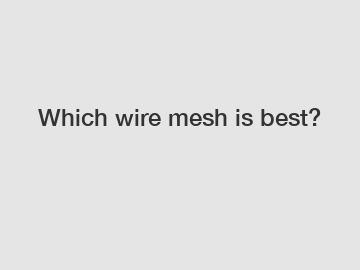When it comes to selecting the best wire mesh for your project, there are several factors to consider. From material and weave pattern to gauge and coating, the options may seem overwhelming. To help you navigate the world of wire mesh, we've broken down some key considerations to keep in mind.
Material.
One of the first decisions to make when selecting wire mesh is the material. Common options include stainless steel, galvanized steel, and aluminum. Each material has its own unique properties and strengths. Stainless steel, for example, is durable and resistant to corrosion, making it ideal for outdoor applications. Galvanized steel, on the other hand, is coated with a layer of zinc for added protection against rust. Aluminum wire mesh is lightweight and easy to work with, making it a popular choice for decorative projects.

Weave Pattern.
The weave pattern of wire mesh refers to the way the wires are interwoven to create a specific design. Common weave patterns include plain weave, twill weave, and Dutch weave. Plain weave is the most basic weave pattern, with wires woven alternately over and under each other. Twill weave is more complex, with wires interlacing in a diagonal pattern. Dutch weave has a tight weave structure, making it ideal for filtering applications. The weave pattern you choose will depend on the specific requirements of your project.
Gauge.
Wire mesh gauge refers to the thickness of the wire used in the mesh. The higher the gauge number, the thinner the wire. For example, a 30-gauge wire is thinner than a 10-gauge wire. The gauge of wire mesh you choose will depend on the level of durability and strength required for your project. Thicker gauges are more robust and can withstand greater pressure, while thinner gauges are more flexible and lightweight.
Coating.
Some wire meshes are coated with a protective layer to enhance their durability and resistance to corrosion. Common coating options include PVC, epoxy, and polypropylene. PVC-coated wire mesh is resistant to rust and corrosion, making it ideal for outdoor applications. Epoxy-coated wire mesh is durable and can withstand high temperatures, making it suitable for industrial settings. Polypropylene-coated wire mesh is lightweight and flexible, making it ideal for decorative projects.
Which Wire Mesh Is Best?
So, which wire mesh is the best choice for your project? The answer depends on several factors, including the application, environment, and budget. If you need a durable and long-lasting wire mesh for outdoor use, stainless steel or galvanized steel with a PVC coating may be the best option. For decorative projects that require flexibility and easy handling, aluminum wire mesh is a great choice. If you need a wire mesh for filtering applications, Dutch weave with a polypropylene coating may be the best option.
Ultimately, the best wire mesh for your project will depend on your specific needs and requirements. By considering factors such as material, weave pattern, gauge, and coating, you can make an informed decision that will ensure the success of your project. If you're unsure about which wire mesh is best for your application, don't hesitate to consult with a professional who can help guide you in the right direction. With the right wire mesh, you can ensure the durability, functionality, and aesthetic appeal of your project for years to come.
For more stainless steel architectural mesh exporter, chainmail curtain, metal coil curtaininformation, please contact us. We will provide professional answers.





Comments
0